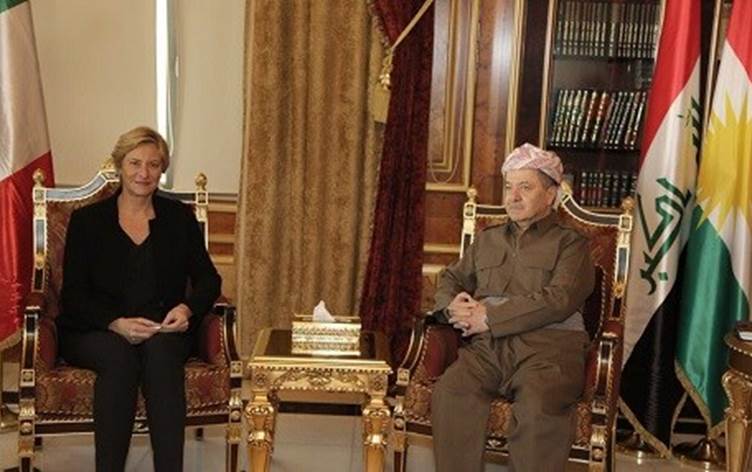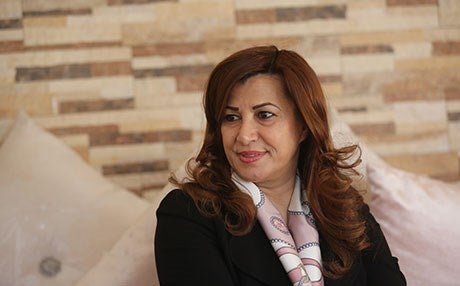SULAIMANI, Kurdistan Region – Last week’s visit to the Kurdistan Region of the Italian Defense Minister Roberta Pinotti was the latest indication of the long-standing strong relationship between Kurdistan and Italy, according to the Kurdistan Regional Government’s (KRG) representative to Italy.
“Italy will continue in its assistance and strong relations with the Kurdistan Region. It will also participate in the reconstruction of Mosul,” Rezan Qadir said.
The first European leader to visit Kurdistan in the beginning of the war against ISIS was Italy’s Matteo Renzi. The then Italian prime minister visited Erbil on August 20, 2014, giving a confidence boost to the Kurds.
Italy is a member of the global coalition to counter ISIS and has the second largest foreign military presence in the Kurdistan Region. They have 800 military trainers, second only to the United States. Qadir said that they have an agreement with Italy and Germany as regards the training of Peshmerga forces, with each country training them for 6 months.
“In the beginning, the global coalition to counter ISIS decided that the Italian forces should go to Iraq, not Kurdistan. But the Italian prime minister and its previous defense minister refused to send their forces to Iraq,” Qadir said.
“The Italian prime minister told me to tell the Kurdistan Region’s president that either Italy will go to Kurdistan to fight ISIS from there or will pull out from the global coalition to counter ISIS,” she added.
She thinks that Italy’s insistence on sending its troops to Kurdistan was not due to better security conditions in Erbil. Rather, it was because of the close relations between the two nations. “Italy wanted to combat ISIS seriously, especially when ISIS was very close to Kurdistan,” she explained.
Qadir also confirmed that the Italian government has given weapons to the Peshmerga forces, including “heavy weaponry.”
“A number of Peshmerga troops have been trained on heavy weapons in Italy.”
Kurdish President Masoud Barzani visited Italy during a trip to Europe a few days before ISIS seized control of the Iraqi city of Mosul. During his visit, the president also met with the pope at the Vatican.
“Barzani gave them accurate information regarding future events. He predicted what will happen in Iraq. ISIS militants attacked a week after the president returned home. They then said that Barzani has correct information about events,” Qadir, who accompanied Barzani in his visit to Europe, explained.
Barzani has visited the state of Vatican six times so far. When ISIS launched an attack on the Kurdistan Region in 2014, the pope, in his Sunday prayer service, called on Western countries to help out the Kurds and Christians of Iraq and Kurdistan. His call for support moved many Western capitals to come to the aid of the region.
The Vatican continues to provide support and assistance to the region’s refugees and internally displaced people irrespective of their ethnic and religious backgrounds. “The Vatican always reiterates that its assistance is not solely dedicated to Christians. They provide support to people of all religious and ethnic backgrounds,” Qadir detailed.
“They once sent some assistance by plane. When it reached the airport, a bishop said that the aid should be sent to Shingal, saying that the Yazidis needed support more,” she explained.
Qadir said that the Kurdistan Regional Government’s (KRG) relations with the Italian government existed even before the KRG established representation in Italy. “In the 1980s, when we were studying in Italy and at times staging protests against the Baath party’s government, the Italian prime minister and other ministers too were showing support for our cause.”
She said that Italian authorities would often say, “We openly discuss with you what you do not want to talk about publicly, and this is the question of Kurdistan’s independence which we will support you in achieving.”
Italy also endorsed the decision to take down Saddam Hussein’s regime in 2003.
The Italian government has also been building friendly business relations with the Kurdistan Region. The Italian Defence and Foreign Affairs Ministries are engaged with efforts to further improve relations with the KRG. On her recent visit to Kurdistan, the Italian defense minister pledged that Italy will treat wounded Peshmerga fighters in Rome’s military hospitals.
“Necessary funds have now been dedicated for this purpose. In the coming days, 16 wounded Peshmerga troops will be flown to Italy for treatment,” Qadir detailed.
Kurdistan Regional Government’s (KRG) representative to Italy Rezan Qadir.
“Italy will continue in its assistance and strong relations with the Kurdistan Region. It will also participate in the reconstruction of Mosul,” Rezan Qadir said.
The first European leader to visit Kurdistan in the beginning of the war against ISIS was Italy’s Matteo Renzi. The then Italian prime minister visited Erbil on August 20, 2014, giving a confidence boost to the Kurds.
Italy is a member of the global coalition to counter ISIS and has the second largest foreign military presence in the Kurdistan Region. They have 800 military trainers, second only to the United States. Qadir said that they have an agreement with Italy and Germany as regards the training of Peshmerga forces, with each country training them for 6 months.
“In the beginning, the global coalition to counter ISIS decided that the Italian forces should go to Iraq, not Kurdistan. But the Italian prime minister and its previous defense minister refused to send their forces to Iraq,” Qadir said.
“The Italian prime minister told me to tell the Kurdistan Region’s president that either Italy will go to Kurdistan to fight ISIS from there or will pull out from the global coalition to counter ISIS,” she added.
She thinks that Italy’s insistence on sending its troops to Kurdistan was not due to better security conditions in Erbil. Rather, it was because of the close relations between the two nations. “Italy wanted to combat ISIS seriously, especially when ISIS was very close to Kurdistan,” she explained.
Qadir also confirmed that the Italian government has given weapons to the Peshmerga forces, including “heavy weaponry.”
“A number of Peshmerga troops have been trained on heavy weapons in Italy.”
Kurdish President Masoud Barzani visited Italy during a trip to Europe a few days before ISIS seized control of the Iraqi city of Mosul. During his visit, the president also met with the pope at the Vatican.
“Barzani gave them accurate information regarding future events. He predicted what will happen in Iraq. ISIS militants attacked a week after the president returned home. They then said that Barzani has correct information about events,” Qadir, who accompanied Barzani in his visit to Europe, explained.
Barzani has visited the state of Vatican six times so far. When ISIS launched an attack on the Kurdistan Region in 2014, the pope, in his Sunday prayer service, called on Western countries to help out the Kurds and Christians of Iraq and Kurdistan. His call for support moved many Western capitals to come to the aid of the region.
The Vatican continues to provide support and assistance to the region’s refugees and internally displaced people irrespective of their ethnic and religious backgrounds. “The Vatican always reiterates that its assistance is not solely dedicated to Christians. They provide support to people of all religious and ethnic backgrounds,” Qadir detailed.
“They once sent some assistance by plane. When it reached the airport, a bishop said that the aid should be sent to Shingal, saying that the Yazidis needed support more,” she explained.
Qadir said that the Kurdistan Regional Government’s (KRG) relations with the Italian government existed even before the KRG established representation in Italy. “In the 1980s, when we were studying in Italy and at times staging protests against the Baath party’s government, the Italian prime minister and other ministers too were showing support for our cause.”
She said that Italian authorities would often say, “We openly discuss with you what you do not want to talk about publicly, and this is the question of Kurdistan’s independence which we will support you in achieving.”
Italy also endorsed the decision to take down Saddam Hussein’s regime in 2003.
The Italian government has also been building friendly business relations with the Kurdistan Region. The Italian Defence and Foreign Affairs Ministries are engaged with efforts to further improve relations with the KRG. On her recent visit to Kurdistan, the Italian defense minister pledged that Italy will treat wounded Peshmerga fighters in Rome’s military hospitals.
“Necessary funds have now been dedicated for this purpose. In the coming days, 16 wounded Peshmerga troops will be flown to Italy for treatment,” Qadir detailed.




Comments
Rudaw moderates all comments submitted on our website. We welcome comments which are relevant to the article and encourage further discussion about the issues that matter to you. We also welcome constructive criticism about Rudaw.
To be approved for publication, however, your comments must meet our community guidelines.
We will not tolerate the following: profanity, threats, personal attacks, vulgarity, abuse (such as sexism, racism, homophobia or xenophobia), or commercial or personal promotion.
Comments that do not meet our guidelines will be rejected. Comments are not edited – they are either approved or rejected.
Post a comment